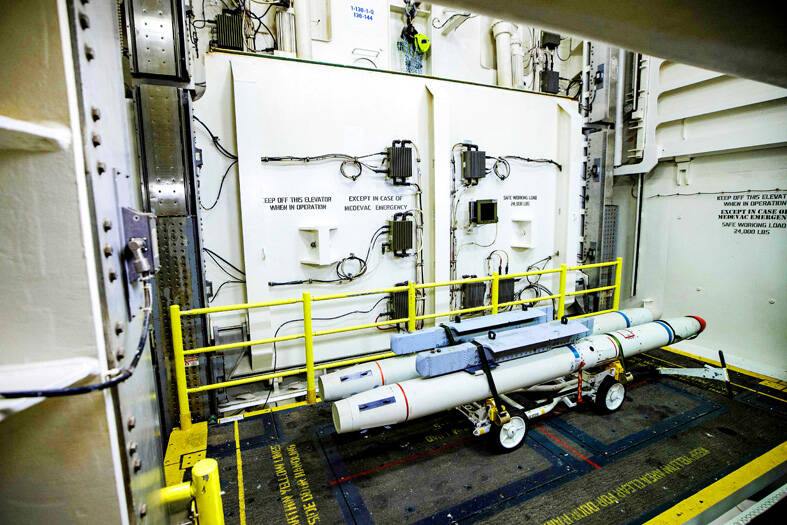The government yesterday thanked the US after it approved the sale of up to US$428 million of spare parts to replenish stocks for military aircraft and support air defenses.
The package is to help the air force maintain aircraft combat readiness in the face of Beijing’s gray-zone tactics, which include sending warplanes into the nation’s air defense identification zone, the Ministry of National Defense said in a statement.
It also exemplified Washington’s commitment to ensure that Taiwan has the capability to defend itself, as stated in the Taiwan Relations Act and the “six assurances,” the ministry said, expressing its “sincere gratitude” for the deal.

Photo: AFP
The sales are likely to be formally confirmed by the US Congress in one month, it said.
The statement came after the US Defense Security Cooperation Agency on Tuesday announced two arms sales to Taiwan, one for standard spare parts, and another for non-standard spare parts and related equipment worth US$330 million and US$98 million respectively.
The two packages are meant to replenish “spare parts, consumables and accessories,” and provide “repair and replacement support for the F-16, C-130, Indigenous Defense Fighter, and all other aircraft and systems or subsystems of US origin, as well as other related elements of logistics and program support,” the US agency said.
The proposed sales are meant to “contribute to the sustainment of the recipient’s aerial fleet, enhancing its ability to meet current and future threats while providing defensive and transport capabilities critical to regional security,” it said.
The Ministry of Foreign Affairs said in a separate statement that the package was Washington’s seventh such deal under US President Joe Biden, which “fully demonstrated the US government’s high regard for Taiwan’s defense capabilities.”
Amid increasing Chinese aggression, Taiwan would continue to improve its defensive capabilities and, through close security cooperation with the US, maintain peace in the Taiwan Strait and contribute to the long-term peace, stability and prosperity of the Indo-Pacific region, it said.
Meanwhile, a defense official yesterday confirmed the early delivery of AGM-88 high-speed anti-radiation missiles purchased from the US in 2017.
The 50 missiles originally set for delivery next year “are already in Taiwan,” Department of Strategic Planning head Lee Shi-chiang (李世強) said at the legislature in Taipei.
Asked whether they are the updated AGM-88E model with an extended range of up to 150km, Air Force Chief of Staff Lieutenant General Huang Chih-wei (黃志偉) said he could not comment on specifics.
The missiles are “slightly better than those currently used by the US military,” Huang said.
An additional 250 shoulder-fired Stinger missiles are also set for delivery this year, with another 250 planned for 2025, Lee said, adding that the US has promised to deliver the full 500 on or ahead of schedule.
However, delivery of TOW 2B anti-tank missiles has been delayed from their scheduled arrival this quarter, Lee said.
Delivery is to begin next year and would be completed in 2024 at the latest, he said.
A Javelin missile purchase is proceeding according to schedule, Lee said.
The only other delay involves AGM-154C joint standoff weapons for the air force, which are to arrive in 2025 or 2026 instead of next year, Lee said.

PREPAREDNESS: Given the difficulty of importing ammunition during wartime, the Ministry of National Defense said it would prioritize ‘coproduction’ partnerships A newly formed unit of the Marine Corps tasked with land-based security operations has recently replaced its aging, domestically produced rifles with more advanced, US-made M4A1 rifles, a source said yesterday. The unnamed source familiar with the matter said the First Security Battalion of the Marine Corps’ Air Defense and Base Guard Group has replaced its older T65K2 rifles, which have been in service since the late 1980s, with the newly received M4A1s. The source did not say exactly when the upgrade took place or how many M4A1s were issued to the battalion. The confirmation came after Chinese-language media reported

A Ministry of Foreign Affairs official yesterday said that a delegation that visited China for an APEC meeting did not receive any kind of treatment that downgraded Taiwan’s sovereignty. Department of International Organizations Director-General Jonathan Sun (孫儉元) said that he and a group of ministry officials visited Shenzhen, China, to attend the APEC Informal Senior Officials’ Meeting last month. The trip went “smoothly and safely” for all Taiwanese delegates, as the Chinese side arranged the trip in accordance with long-standing practices, Sun said at the ministry’s weekly briefing. The Taiwanese group did not encounter any political suppression, he said. Sun made the remarks when

The Taiwanese passport ranked 33rd in a global listing of passports by convenience this month, rising three places from last month’s ranking, but matching its position in January last year. The Henley Passport Index, an international ranking of passports by the number of designations its holder can travel to without a visa, showed that the Taiwan passport enables holders to travel to 139 countries and territories without a visa. Singapore’s passport was ranked the most powerful with visa-free access to 192 destinations out of 227, according to the index published on Tuesday by UK-based migration investment consultancy firm Henley and Partners. Japan’s and

BROAD AGREEMENT: The two are nearing a trade deal to reduce Taiwan’s tariff to 15% and a commitment for TSMC to build five more fabs, a ‘New York Times’ report said Taiwan and the US have reached a broad consensus on a trade deal, the Executive Yuan’s Office of Trade Negotiations said yesterday, after a report said that Washington is set to reduce Taiwan’s tariff rate to 15 percent. The New York Times on Monday reported that the two nations are nearing a trade deal to reduce Taiwan’s tariff rate to 15 percent and commit Taiwan Semiconductor Manufacturing Co (TSMC, 台積電) to building at least five more facilities in the US. “The agreement, which has been under negotiation for months, is being legally scrubbed and could be announced this month,” the paper said,